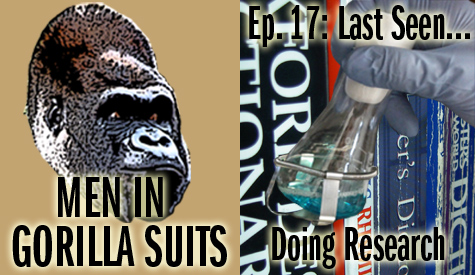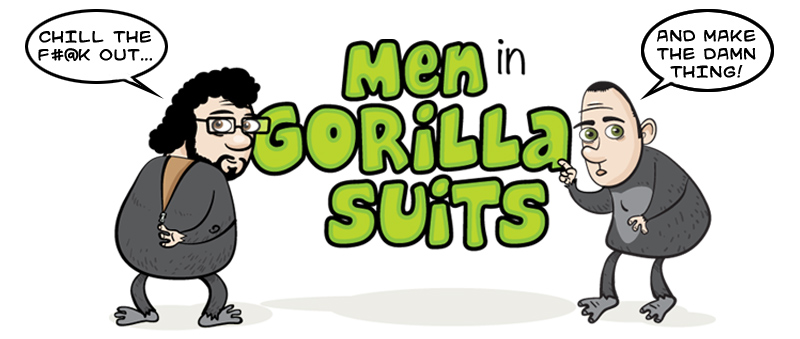 Ah, microfiche! We friggin’ LOVE microfiche, even today (especially today)! Libraries? Wonderful things — perfect places for…research! This week, we’re talking all about research: online, in libraries, and research obtained simply by living a cool life! More specifically, we’re discussing writing research.
Ah, microfiche! We friggin’ LOVE microfiche, even today (especially today)! Libraries? Wonderful things — perfect places for…research! This week, we’re talking all about research: online, in libraries, and research obtained simply by living a cool life! More specifically, we’re discussing writing research.
Does every story need to be researched? Shawn spins the adage, “Write what you know,” on its head, making much better sense of the saying. Christopher gives in and is forced to admit that he researches much more than he thought he did. Along the way, Shawn mentions why cramming 10 pounds of poo into a 5-pound bag is not a good writing move, and Chris sings praises to Jim Lynch. We also discuss some of our specific research methods (Christopher: “ALL HAIL EVERNOTE!!!”), and it’s revealed how Shawn’s 47 Echo series is really all about tap dancing mimes!
Whether you research for writing, school, hobbies, or other reasons, we hope this episode has something that can help you.
Podcast: Play in new window | Download

My novels tend to be realistic fiction, so I’ve gotta do my research. The more I research my story, the more I know my story, and the more I can write my story. Come to think of it, I even research my flash fiction. I’m a stickler for realistic locations. I get on Google maps to get distances between locations, and I look at the actual neighborhoods. Of course, most of what I find through my research doesn’t end up in the book. I just like to *really know* my story.
Shawn: I also research things that don’t exist (yet). It’s required for speculative sci fi. Lucky for me, I enjoy learning about future technology.
Christopher: Venomous insects? You got my attention!
I love “Throw Momma from the Train,” that’s the best writing movie ever . .
And speaking of kidneys, I have 4 . . teehee 🙂
CMS: I definitely do more research than I’d like. Not that I don’t like researching, but I tend to do just enough to tell the story. Granted, there’s still a pile of research in most things I write that never sees the page. Maybe only 15% – 20% sees the page. One thing I love is blurring lines. I’ll make some places actual locations, but then make up places that don’t exist. In the story with the venomous insects, professional wrestling plays a role in the story. There’s an old wrestler, and he mentions real wrestlers and wrestlers I’ve just made up. One could point out on a map where the town is in Wisconsin, but so much of what’s in that town is made up.
The insects. They make no sense in many ways, but they serve the story. And I’ve done enough research to be able to argue that they could exist. That’s what matters. The insects didn’t change at all from when I first thought, “This book needs these little milky white beetles…” but now I know how they could have come into existence. Really, the entire book backs up a lot of what Shawn talks about in knowing what you write. I could have done a lot more research, but so much of what made pages is stuff I just know about and love. I love quirky little towns in the north woods, weird characters, insects, professional wrestling (even though I haven’t watched in years), caves, art, cooking, and everything else that makes up the story. I know I will write better things, but I’m not sure I’ll ever write a more “me” book as long as I live.
Four kidneys, eh? We know from whom we can harvest kidneys to fund the podcast, Shawn!
Okay, two comments here about research and over-research.
As soon as you started talking about over-researching immediately my mind went to Michael Crichton’s Rising Sun. That book irritated the fire out of me as its over-research was so jarring and took me out of the story.
Every chapter it was constantly “Looks like they used . Oh, you don’t know about this? Let me explain real quick…”
I don’t know if his other novels are formatted the same way, but he comes across as a disgruntled researcher.
The other comment is the ‘invisible touch’ comment Shawn made. A lot of problems I have with books which is “Hey, look at the research I brought to this sentence.” The camera analogy is a perfect example of this.
In TV media, another great analogy is The 70s Show and when they tried to make a That 80s Show and it got canned.
With That 70s Show, it worked because it was great story-telling that just happens to be set in the 70s. The reason That 80s Show failed was it was constantly “80s Reference” hitting you over the head. It wasn’t a Rubik’s cube being played with while the story progressed, it was “Hey what’s that?” “Oh, it’s called a Rubik’s Cube….but I doubt it would ever be popular.” ::rolls eyes::
Well crap. I guess comments supports html tags as my comments with greater/less than brackets are gone.
So, here’s two paragraphs edited:
Every chapter it was constantly “Looks like they used [insert tech and/or Japanese history here]. Oh, you don’t know about this? Let me explain real quick…”
With That 70s Show, it worked because it was great story-telling that just happens to be set in the 70s. The reason That 80s Show failed was it was constantly “80s Reference” hitting you over the head. It wasn’t a Rubik’s cube being played with while the story progressed, it was “Hey what’s that?” “Oh, it’s called a Rubik’s Cube….but I doubt it would ever be popular.” [insert laugh track because it was ironic] ::rolls eyes::
The couple Crichton things I tried reading were like that…just research dumps. It’s jumped out even in literary fiction for me. Can’t remember the book, but there was an undertaker as a character and this whole thing about the slant of the table to make drainage easier. Which is interesting, but when you have a character thinking about deep things and then just wedge in a tidbit that the character wouldn’t think…it’s clunky. I juggle; I don’t sit there thinking about the construction of juggling clubs while juggling anymore than an undertaker — in their head — is going to be thinking about how the table where bodies rest have a slant built into them for easier clean up. Crichton seemed like that when I’ve tried reading him — just this whole, “Here, let me have this character do a monologue to show you how much I researched…”
That 70s Show had some great moments that captured the feel of the time, and even brought in accurate specifics without calling attention to things. That’s what good writing does — gives the reader enough so they know, “Oh, that must have been a thing, then,” without having a character break into reciting a Wikipedia entry like they break into song during musicals. It can be hard at times, but when you accept that most of what you researched won’t make it into a story, it’s not so tough.